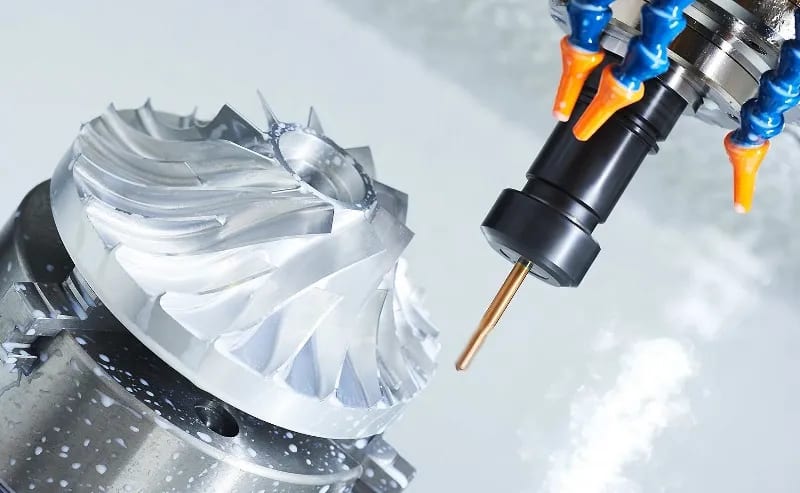CNC Training: Benefits & Career Insights
Unlock the benefits of CNC machining with our hands-on CNC machine training. Learn CNC, enroll in our CNC course for machine education.
Fascinated by planes and all things space?
If so, becoming an aerospace machinist might be the perfect career choice.
The aerospace industry encompasses all types of flight vehicles, from unpowered gliders and sailplanes to military aircraft and even space launch vehicles. There are many different avenues to take if you’re looking to work in the industry — including CNC machining.
If becoming a machinist in aerospace sounds interesting to you, you’ve come to the right place. Keep reading to learn all about this career path, including job duties, salary, how to become an aerospace machinist and more.
Before getting into the specific duties of an aerospace machinist, let’s get a better understanding of exactly what the aerospace industry entails.
According to Britannica, the aerospace industry refers to the assembly and manufacturing of parts for air and space vehicles used within and beyond Earth’s atmosphere. Those who work in the industry are involved with the research, development and manufacturing of various vehicles, including:
So, how do aerospace machinists fit into the equation?
These professionals create detailed aircraft and spacecraft parts using different types of mechanically and computer-controlled machines, like lathes and grinders. They may create parts for a specific type of aircraft, like rotary-wing airplanes, and ship them to a buyer, who will use them in production.
Read: What Are CNC Machine Operators? How To Become One
There are two main types of aerospace machinists: production machinists and maintenance machinists.
Read: What Is a Quality Control Inspector?
The job of an aerospace machinist, or a machinist in general, requires a specific set of skills. Some of these include:
As with most industries, the salary of an aerospace machinist can vary based on several factors, like employer, specialty and level of experience.
Some machinists start out as CNC operators and choose to take their knowledge and skills to the aerospace industry. According to the Bureau of Labor Statistics (BLS), the median annual salary for computer numerically controlled (CNC) tool operators in the United States was $48,550 in May 2023.34 This means half of CNC machinists earned more and half earned less. While this might not be the exact salary of an aerospace machinist, it can provide a general idea of income potential for those working in the field. Also keep in mind that salary depends on several factors, including experience, employer, demand and cost of living in the area.

To start training for a CNC career, consider applying to the CNC Machining Technology program at Universal Technical Institute’s NASCAR Technical Institute campus. This 36-week curriculum teaches students foundational machining skills, combining both theoretical knowledge and practical application to prepare them for a career in CNC.2,85
By applying to our trade school, aspiring techs can also access our student support services, such as:
During the CNC program, immerse yourself in a curriculum that covers a range of topics, from basic machining to advanced CNC operations. Key areas of study in our CNC Machining Technology program include:
After completing the CNC program, graduates can pursue a career as a trained CNC machinist across multiple industries, such as the aerospace, defense, electronics and medical fields. The skills learned will open doors to various manufacturing roles. If you need help finding opportunities in these areas after graduation, contact our Career Advisors!
After securing a position, aspiring machinists should be ready to engage in further on-the-job training to refine their skills and adapt to their specific roles within the industry. With enough time and experience, they can pursue roles in more specialized fields, such as aerospace!
A machinist in the aerospace industry plays a crucial role in manufacturing parts for aircraft and spacecraft with extreme accuracy. They operate precision machinery, including CNC machines, to create or modify metal parts that meet the strict standards of aerospace engineering.
Becoming an aerospace CNC machinist requires a blend of technical skills, such as proficiency in operating CNC machinery, a strong understanding of engineering blueprints, and knowledge of the properties of different aerospace materials. Attention to detail and the ability to perform precise measurements are also important traits to have.
Aerospace precision machining stands out because of its extremely high standards for accuracy, tolerance and surface finish, driven by the critical safety requirements of aerospace components. Unlike conventional machining, it often involves working with advanced materials and complex geometries specific to aerospace applications.
Common materials used in aerospace CNC machining include aluminum alloys, titanium and composites. These materials are selected for their strength-to-weight ratio, corrosion resistance and performance at high temperatures, making them ideal for various aerospace applications.
The career prospects for aerospace machinists are promising, with an ongoing demand for skilled technicians to manufacture and maintain an increasingly sophisticated fleet of aircraft and spacecraft. Opportunities exist in aerospace manufacturing companies; maintenance, repair and overhaul (MRO) firms; and government agencies focused on space exploration and defense.
The CNC Machining Technology program is available at UTI’s NASCAR Technical Institute campus in Mooresville, North Carolina. In addition to offering hands-on training, the Career Services team at NASCAR Tech offers a variety of resources to assist students in their job search after graduation, including specialized opportunities for an aerospace machinist career. These resources include:
Classes for the CNC machining program begin frequently, so you can start training and prepare for your career sooner!
To learn more, contact an Admissions Representative by calling 1-800-834-7308 or by visiting our program page to request information online!
Universal Technical Institute of Illinois, Inc. is approved by the Division of Private Business and Vocational Schools of the Illinois Board of Higher Education.